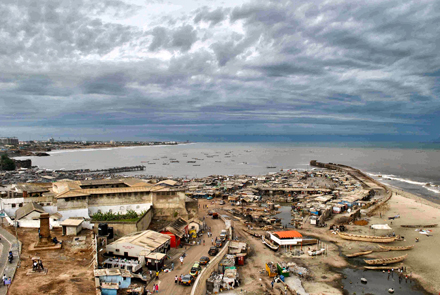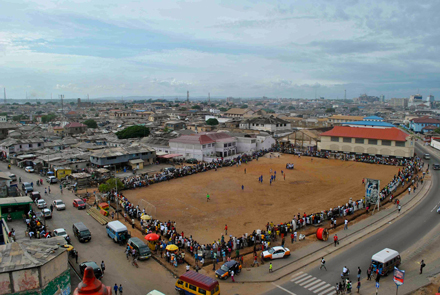
By Lorenzo Daïeff
“Order!” The shout hails across the room. “Order!”
An elderly, black-robed man is trying to get some attention. “Oooorder!” All too little avail: as his voice echoes around the country, life in Accra, Ghana goes on like it always has: people walk through the streets, navigating narrowly between taxis and open gutters; the wind, carrying an Atlantic breeze, sweeps over the city; and I, sitting at my desk, type away at my keyboard.
I am sitting in the library of the Centre for Democratic Development (CDD), somewhere in one of the city’s fancier neighbourhoods. Across the room sits a TV, which, like every weekday since the start of my internship, plays the most popular show of the country at this time, of which the elderly man is but a small part.
The show usually starts around 10, it goes on for an undefined amount of time – which varies every day – and it is exceedingly tedious. And yet, it flickers across screens and blasts out of radios nation-wide, and everyone has a strong opinion about it. Ghana is currently engaged in its first Election Petition trial, a landmark court case which will decide the validity of last December’s 2012 presidential elections.
Suddenly, arias of classical music surround me – always the same tune, used by the broadcaster to bridge the occasional bouts of silence in the courtroom. I sit back, relax, and ponder: were the elections rigged? My taxi driver this morning was convinced of it: the chairman of the electoral commission is a man of the winning party, he says, the official results cannot be trusted. The judges? They are bought, too, he assures me. Yet just the day before, another driver had insisted on the opposite: the losing party ran a bad campaign, and is looking for an excuse for its poor performance; they should move on, look ahead, and avoid destabilising the country with fraudulent accusations. Who knows who is right? The court is expected to decide soon.*
Meanwhile, the country buzzes along like the trotros down the main arteries of Accra – a series of ragged minibuses which serve as the main mean of public transport, connecting places like ‘circle’ to ‘papaye’, and ‘37’ to ‘shangri-la’. On my ride back from work, I sit at the back, and enjoy the odd peace that the interior of a trotro provides: people seldom speak, and even the mate – the fare-collector – collects his money without a sound. Outside, the lights of the city whiz past, and I stare out into the night, which falls early in these latitudes.

When I am lucky, I catch a glimpse of one of the many cornershops in the city, whose names are a testament to Ghanaians’ creativity: examples include not only the amusing “As if but Not Enterprises” or the unambiguous “Don’t Mind Your Wife Restaurant,” but also the slightly unusual “Touch Not My Anointed Shop,” and the rather surprising “Ladyboy Kids Kindergarten.” Travelling through a small town in the North of the country, I even stumbled upon the “Same God Enterprises,” a touching name in a region inhabited by Muslims and Christians alike.
Back in the trotro, the radio is now on, and although it is in the local language, references to the lawyer Tsatsu Tsikata give away that the topic is the court case – what else? Indifferent, to my left and my right, my bench neighbours are on their smartphones, surfing the internet or playing games. Do they represent the average contemporary Ghanaian? They do not: two men, likely with stable jobs, living in Accra, they are among the better off. But they are not an extraordinary sight, either, and not the elite; merely products of the economic boom the country is experiencing, which has brought fat cars and fast phones – or vice-versa – to some streets of the capital.
As we make our way through dense traffic, I turn back to the book I picked up in the CDD’s library, a copy of Jacob Riis’ How the Other Half Lives. In it, Riis describes his ventures through the slums of New York in the 1880s, where he was at once fascinated and horrified by the living conditions.
A trip to developing countries excites, I think, very similar reactions. How is it, one wonders, that the other half lives? Their reality is difficult to assess for the one-time foreign visitor, but there are signs. Signs, such as this one, on the wall, which announces a vacancy: security guard, 250 Ghana Cedis monthly (roughly $125 USD). Four dollars per day, far above the World Bank’s dollar-a-day poverty line; but also just what I spend per day on trotros and street food, excluding rent and with no dependants. How does it add up?

The trotro pulls up. I get off and walk for a bit, down the fancy Oxford Street with its KFC and pizza take-aways. I go left-right-left, past a few shops – electricians, hairdressers, tailors – and down to a park which is really an uneven sandlot and which doubles as soccer field, running track, and prayer ground, sometimes simultaneously. As I was jogging around it the other night, a car kept following me slowly, tracing slow circles into the sand of the park, again and again, its headlights illuminating my tracks. Intrigued, I asked my colleague about it the next day. She smiled, and explained the obvious: somebody had been learning how to drive.
I leave the park behind, and climb into our ‘ivory tower,’ a luxurious flat that overlooks Accra and the Atlantic, shared with fellow McGill students and another woman. The contrast with the average Ghanaian’s dwelling is as unsettling as the view from the balcony is stunning. Looking out onto the city, a few palm trees in sight, I am optimistic about the country. Ghana has earned much praise in recent years, both for its economic upswing and for its peaceful pattern of democratic government. Many Ghanaians I have spoken to do not share this optimism, and suspect, with good reason, that they will not benefit from the boom.
In turn, the neighbouring Togolese seem to rave about Ghana and its universities, its road interchanges, and even its opposition parties. Speaking of which, I need to finish reading a paper about political parties, to help one of CDD’s research officers with a report commissioned by Oxfam. And tomorrow, it all starts over again: trotro – boulot – dodo, like the French say. But before that, there is a night concert on the beach, and as the crowd goes wild dancing Azonto, I am hoping that the court is rowdy tomorrow: I may need some solid calls to order, and no classical arias, to keep me alert at work.
* The case was ultimately decided on August 29, when the Supreme Court upheld President Mahama’s victory. The opposition accepted the ruling, and pledged to move on
Lorenzo Daïeff is an MA student of Political Science at McGill, concentrating on comparative politics and political economy. He has a Bachelor of Arts degree in Philosophy, Politics and Economics from the University of Oxford. His experience includes consultancy work with OxAID (Oxford Associates for International Development), as well as an internship with the Centre for Democratic Development Ghana (CDD-Ghana), described above.
